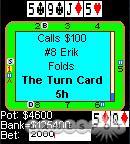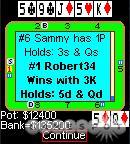Mobile developer Summus didn't feel like hedging its bets on its new entry into the Texas Hold 'em mobile sweepstakes. As a result, it went out and purchased one of the best Hold 'em names money could buy to put behind its product--that of the illustrious Phil Hellmuth, winner of the 1989 World Series of Poker and all-around Hold 'em pundit. Phil looks great on the title screen of his eponymous Texas Hold 'em game, but such superficialities do not a mobile poker game make. It takes a skilled artificial intelligence or, barring this, a functional real-time multiplayer to satisfy that special subgroup of mobile-gaming Hold 'em fanatics. Although they are almost subsumed by an unwieldy, archaic user interface, Phil Hellmuth's Texas Hold 'Em has both.

Phil Hellmuth's Texas Hold 'Em brings a bunch of options to the table for customizing the single-player experience. You can set up a 5/10 structured-bet game, play $2,000 Pot Limit (which allows you to bet up to the amount that's already in the pot), go for broke in No Limit, or put your back to the wall and try to take a mobilized Phil to the cleaners in Play Phil No Limit. You can also set the number of AI opponents to a maximum of seven, and you can change the speed at which the game is played.
This is a handy feature indeed, since you may well consider slowing down the pace when you encounter the AI opponents--even if you presently fancy yourself a poker whiz. They bluff, juke, and jive to beat the band, occasionally adopting complex strategies (for mobile poker, at least), like check-raising. They rarely make stupid calls and will react to what you're doing with reasonable acuity. If you behave inconsistently or demonstrate any weakness in a particular hand, they'll start raising the stakes to make you squirm. The AI isn't perfect by any stretch, though. It doesn't like to fold as much as you would expect, and it lacks the wisdom to judge your strength accurately, so you can usually beat one or two players by playing aggressively. However, if you try to tackle four or five of these guys at once, they'll turn into a real handful. The Phil Hellmuth bot plays several cuts above the normal AI (especially in the belligerence department) and will give most players a serious run for their money. All told, the Phil Hellmuth poker AI is one of the best we've seen on mobile.
The multiplayer implementation is also fairly robust. The system supports 500 eight-man tables each for 5/10, Pot Limit, and No Limit. Each player is clocked to ensure that he or she doesn't take an inordinate amount of time to make a decision, and there's little obvious lag between multiplayer moves. The game also keeps track of your "bank" between games, so you can easily compile your all-time success in the multiplayer and single-player games.

The one large caveat to Phil Hellmuth's Texas Hold 'Em has to do with its graphical user interface, which is ugly and confusing. You can switch between two visual modes--one that is primarily text-based and displays each move in sequence and another that ditches the scrolling-text window for a somewhat more intuitive system that displays each player's move in a text bubble. In both cases, the pixelated, four-bit graphical style suggests an extremely cursory aesthetic effort more suited to 1989 than 2004. This wouldn't ordinarily matter as much for a poker game, but the graphics here are actually bad enough to impede gameplay a little. The text window is filled with visually undifferentiated information; it updates quickly; and it does not appear to be scrollable. In both modes, minuscule--almost unreadable--icons denote the dealer, big blind, small blind, and a player's cards. Competitors, like Downtown Texas Hold 'Em, lack any graphical denotation for the blinds, but generally do a much better job of laying the game out in a clear fashion.
It's clear that Summus invested most of its development efforts in Phil Hellmuth's AI and multiplayer systems. This was an excellent decision, because its poker offering is filled with options and is a very engrossing play for poker fans. Nevertheless, Summus would have done well to devote a little more attention to the game's basic graphical infrastructure.